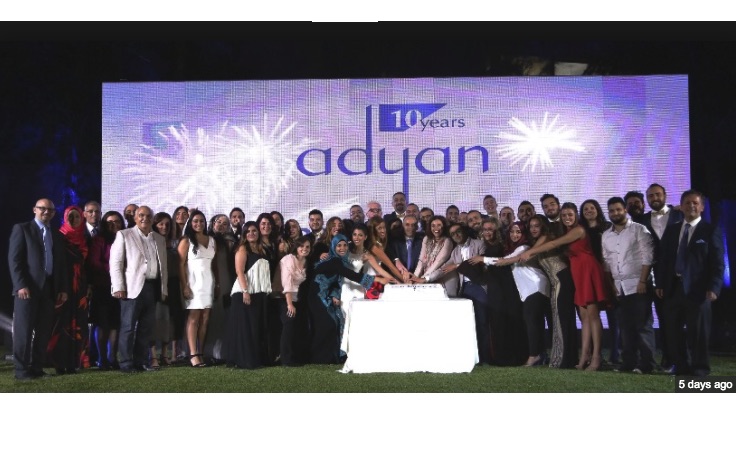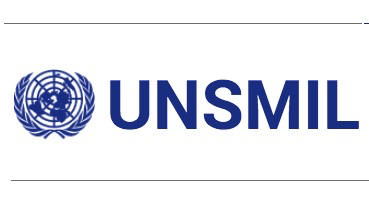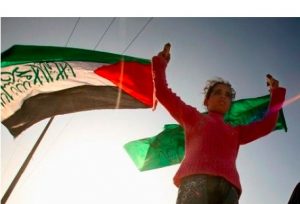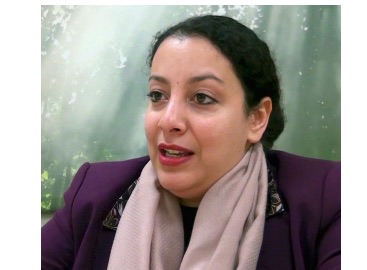DISARMAMENT & SECURITY .
An article by Mark Levine for Tikkun
Ahed Tamimi is now a statistic. Just one of thousands of Palestinians illegally imprisoned by Israel as it crosses the half way point of its fifty-first year of Occupation – 6154 to be exact. 59 of them women, 250 of them children, and now one more. Ahed is in jail because she “slapped” an Israeli soldier who was occupying her house not long after he or another soldier in his squad shot her cousin in the head with a rubber bullet, forcing him into a coma. Ahed, along with her cousin and then her mother, came out and started shouting at the soldier to leave, and pushed him. He seemed to push back. She kept shouting and push-hit him several more times, continuing to yell even more. Her mother filmed and then uploaded the scene.
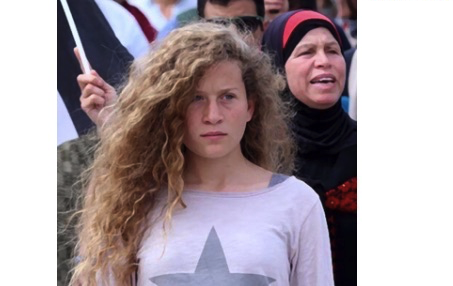
Apparently, Ahed is an existential threat to the state of Israel, and perhaps they’re right. Israeli commentators went ballistic at the viral video, lamenting how she emasculated the soldiers who showed such remarkable restraint in not beating her with the butt of their guns, or just shooting her like her cousin. Not long after, she was seized by security forces, and has since been charged with assault, and her detention extended. No word yet on what the soldier who shot her cousin will be charged with (nor will it ever come).
The first time I met Ahed Tamimi was about five years ago when she was around 11 years old. She wasn’t yet famous (or infamous, depending on your point of view); it was before the video of her threatening an Israeli soldier with her tiny fists, fearless and filled with fury, hit the internet. But it was already clear what she would become: a fighter. She was a hero-in-the-making; a star at the early stages of going nova. Not quite exploding yet but only a matter of time and nothing could stop her. Not her parents, not the rest of her family, not the Israelis unless they killed her.
Nabi Saleh and the Renaissance of Civil Resistance
Like everyone else who meets Ahed I was in her village, Nabi Saleh, to witness weekly demonstrations against the Occupation. Nabi Saleh is a small and picturesque village in the central West Bank overlooking a valley with an important spring. In a normal world, or at least a better one, I’d be visiting with my kids, hiking in the hills, swimming in the spring before settling down to a nice dinner in a family-run restaurant—most of the West Bank is so stunningly beautiful it could compete with Switzerland for both the vistas and the food. But the world and certainly the West Bank are far from normal; and I wouldn’t take my kids there now, not yet anyway. They’re too young to experience what Ahed and the other kids of the village, and every other square meter of the West Bank, Gaza, and East Jerusalem (not to mention too many refugee camps, from Tripoli to Yarmouk) have lived through for over half a century.
Instead of being a tourist center, Nabi Saleh is a resistance center, one of the most important places on the planet, the site of the real Armageddon (Megiddo) for humanity’s soul. No, I’m not exaggerating. In a powerful column written after Ahed’s arrest Lisa Goldman writes that Nabi Saleh is where she “lost her Zionism.” It’s impossible not to lose your Zionism when you’ve experienced Nabi Saleh. The evil and brutality of the Occupation burn through whatever fantasy of a mythical liberal Zionist dream with which you might have arrived. But I hope that Goldman didn’t only lose part of herself. The experience is far deeper than that. In losing your Zionism, and if you’re being honest, any fantasy of a humane nationalism of whatever ethnicity or creed along with it, you become open to something far more powerful than an out-of-date ethno-religious identity.
Nabi Saleh was where I re-found my humanity. It has become the heartbeat of Zion—the Zion of the Matrix, the post-Apocalyptic holdout for the rainbow vision of what remains of humanity after we destroyed ourselves, not of the nationally and religiously and racially exclusivist Zionism of the real world. Indeed, the only time I feel hope when I’m in Israel or the Occupied Territories is when I’m in Nabi Saleh or one of the other resistance centers, when Palestinians, alongside international and Israeli activists, work together with one goal—to stop the occupation, even at the price of their own well-being and even life (Israeli and international activists have routinely been beaten and even shot during these protests).
Resistance Theater
Along with the village of Bil’in, and more recently the Sheikh Jarrah neighborhood of East Jerusalem, and half a dozen other locations in the West Bank such as Atwani and the Jordan Valley, Nabi Saleh has been the site of regular (for the most part, weekly) protests against the Occupation for much of the last decade. What makes these protests so important is that they have become the testing ground for militant civil resistance against the Occupation, perhaps the most important tool left to Palestinians to hold the line against (turning back is a distant dream) the ever-expanding territorial encroachment by Israel across the majority of the West Bank that remains under its direct control.
I use the term “civil” rather than “non-violent” resistance because the protests are by no means free of violence. They start off that way—every Friday dozens of people gather at the center of the village, pick up their hand made signs, begin their chants, and march one and all—old and young, Palestinians and (Diaspora and even Israeli) Jews, locals and “internationals” – to the patch of hill between the top of the village and the valley road and spring below, which is coveted by the nearby settlement of Halamish (in fact, only six weeks ago, in October, the Israeli government issued orders seizing yet more land from the village to expand the settlement).
But when the marchers approach the top of the hill, the hill itself, which is usually still empty, suddenly fills with Israeli soldiers at the bottom along the road that leads to a nearby military encampment. And then the performance begins. The soldiers tell the protesters to go back; they refuse. They threaten to fire teargas; the people march forward. Either the tear gas starts or some of the kids start to throw stones (they rarely get close to the heavily armed and fully protected soldiers) but within a few seconds the ‘production’ is in full swing. I say ‘production’ because Nabi Saleh is nothing if not theatre; take your pick: theatre of the oppressed, of the absurd—a “dialectical” or “episches Theater” of the type developed by 20th century luminaries like Piscator and Brecht who desperately wanted to create a political theater that could better represent the intense ferment of inter-war Europe, particularly from below.
If it’s a good day, no one gets too badly hurt. The people protest, kids throw stones and taunt the soldiers well over 100 meters away. The soldiers, if they’re not in a bad mood, don’t unload dozens of canisters at a time, and sometimes people make it to the bottom of the hill, where they sit and chant a few feet from the road while the internationals and the Tamimi family takes video and pictures. A few will try to cross the road to reach their spring, which rarely happens as the soldiers inevitably grab them and push them back. When someone does get through, it’s like scoring the winning touchdown at the Super Bowl.
At some point Ahed or one of the older kids gets up and walks over to the Israeli in charge and uncorks a monologue against the Occupation and his presence on her land that is every bit as eloquent as any Martin Luther King, Jr. unleashed against Jim Crow. Ahed has no fear—NO FEAR. Her hair alone, the likes of which have not been seen around here since Samson, could hold its own against a squad, if not a platoon of Israeli soldiers. I think the soldiers actually have a grudging respect for her and her family. They might be enemies, but they know what they’re really doing there, and they know Ahed and her family are doing precisely what they’d do in her position, if they had the courage.
But if the afternoon is getting late and Shabbat and the weekend are beckoning, the soldiers’ fuses invariably get short. At some point the commander calls or signals her father or another family elder in some way and lets them know it’s time to go home, the play is over. Usually the adults try to disperse the crowd at that point. The international activists and the Israelis as well as the older Palestinians usually begin marching up the hill, more or less out of breath from the tear gas but not too much the worse for wear. One or two might be hunched over or have big welts from being hit by plastic coated steel bullets, but if they weren’t shot at too close range, or in the eye, the injury isn’t too serious. The kids stick around and throw a few more stones, but it all fizzles out soon enough. Solidarity and love pervades the air. It’s the closest to Selma most Americans there could ever hope to get, and in that sense it’s truly like reliving history. Because Nabi Saleh is, in a way, Selma.
Sometimes, however, the Israelis are in a particularly pissy mood, and then all hell breaks loose. It’s hard to describe the experience of being caught in one of these attacks. More tear-gas than you can imagine, rubber bullets, real bullets whizzing by (and if you’re unlucky, into) you, sound grenades that can pop your ear drum from meters away. Members of Ahed’s family have been killed in these attacks; one had his head half blown off by a tear gas canister fired at him from close range.
Every year it seems like the gas gets worse. The last time I was there I misread the wind and got lost in a cloud and, for the first time there, felt like I was going to die. The gas paralyzed me, I could neither breathe nor move, and I literally sunk to the ground watching my life go by, before a small hand reach into the haze from above, grabbed me, and with a strength I still can’t comprehend, literally pulled me up the hill above it. The hand belonged to Ahed’s cousin Muhammad, then around 11 or 12. The same Muhammad shot in the head earlier in the day when Ahed confronted Israeli soliders responsible for his injuries for which she is now being detained.
(article continued in right column)
Question related to this article:
Presenting the Palestinian side of the Middle East, Is it important for a culture of peace?
How can a culture of peace be established in the Middle East?
(article continued from left column)
Once the performance is over, people either head home back to other towns in the West Bank, to Israel or for many of us, enjoy the ritual of dinner with the Tamimis and a night spent sleeping on their living room floor. In these quiet evening moments Ahed and the other kids actually seem like normal kids, dancing and playing, talking, practicing English with guests when they’re not sitting patiently for interminable interviews by activists and journalists. Meanwhile her father Bassem and uncle Bilal immediately upload the days videos and photos onto the internet to make sure a permanent record of the protests exists. Most of the time it’s rather banal watching, but sometimes they capture the horror of their own family members being shot and killed.
If they’re lucky, Saturday and the beginning of the next week are calm and life returns to normal, at least till next Friday when it begins again. But often it’s not so lucky. If you scroll through the videos on the Nabi Saleh YouTube channel you’ll find innumerable videos of midnight raids by Israeli soldiers, of attacks with “shit water” that is sprayed for no reason all over the village and even inside their home, of family members being dragged away into custody for no reason. Most everyone in the family has been beaten, arrested, and even shot. Ahed and her young kin as well as the women of her village are usually left to fight the Israeli soldiers because if an adult man were to go anywhere near a soldier he’ll be shot dead without a second thought.
Believe me when I tell you that you have no idea what life is like for the people of Nabi Saleh, even when you’ve spent many Fridays with them. Or for the people of Bil’in, or the Jordan Valley, or Jenin, or the Hebron Hills. Never mind Gaza. Simply put, we get to leave. They are fighting for their futures, for their lives. This is Palestine.
My Daughter and Their Daughter
The first Friday I spent with the Tamimi family I texted my daughter, who was then about 8, a picture of Ahed, with the caption “This is the bravest girl I’ve ever met and I hope you grow up to be like her.” And I meant it, although until Trump was elected President I didn’t think she’d actually have to fight like Ahed, to confront cops here the way Ahed confronts soldiers there. The night Trump won I reminded her of that text, and let her know I might have to bring her to Nabi Saleh sooner than I’d hoped for training. I wasn’t joking, she wasn’t laughing.
Israelis like to criticize Ahed’s role as a child engaged in the struggle against the Occupation, just as they criticized young people throwing stones during the Intifada. They say that the role of children on the front lines shows that Palestinians hate Israelis more than they love their children, and similar arguments. Like many Israeli arguments, this one seems reasonable until you consider it a bit more closely. Let’s start with the obvious question: If Israelis love their kids so much, why do they send them to be brutal occupiers year after year, decade after decade? To shoot, arrest, torture, and kill Palestinians, including thousands of children? Why do they sell their children’s souls for a piece of land that is already inhabited by someone else who’s been there for centuries, when they’ve already conquered most of the land decades ago?
And if Israelis were so concerned about Palestinians children, how come they harm and kill so many of them year after year? Give me a break. Let me be clear: I don’t want my kids anywhere near the violence and hatred I’ve witnessed in Israel/Palestine, but if I were forced to choose, I’d send my kid to fight against a brutal occupation a lot sooner than I’d send her or him to enforce it. I can understand why Bassem watches with pride through the tears as his daughter becomes a leader of the Palestinian struggle before the world’s eyes. What I can’t imagine is how Israelis can watch as their children arrest, beat, shoot, and otherwise humiliate and oppress Ahed’s family and the entire Palestinian people. As Michael Lerner warned two decades ago, their “settler Judaism” is among the gravest threat to Judaism since the Holocaust. If this is Judaism, Hitler won. If you don’t understand this, you’re not paying attention.
No Way to Stop the Performance
But all this is beside the point, because no one is sending their kids to do anything. It’s impossible to stop them. They are growing up in the midst of an unimaginable and unending Occupation. They live without hope and with trauma and violence that is exceeded in only a few even more tragically star-crossed places like Syria, Yemen, Rohingya, or eastern Nigeria. The only hope they have is in fighting, however they can, against the Occupation. “To resist is to exist” the Zapatistas have long said (and Palestinians as well) – “morir para vivir” (dying in order to live). It’s a common theme wherever oppression rules the land. As I wrote above, no one can control Ahed; not when she was 8, and not when she’ll be 18.
Ahed’s parents could chain her to a bed but I’m sure she’d find a way to break those chains. She could very well single-handedly break the chains of a half-century occupation if the Israelis aren’t careful (and they know this, which is why they’re now trying to lick her away, far from the media, people forget about her). People are already imagining her as the first true President of Palestine. Others worry all the focus and hype directed to her is dangerous and doomed to backfire. I think it’s more likely she’s going to be the first Prime Minister of Israel/Palestine; Israelis would be lucky to have her.
People are also criticizing Ahed and the Tamimis for “staging” or otherwise planning her protests. Of course they do. That’s the whole point. They understand that the only way they stand a chance against the Israelis is to play by the script, by the rules of engagement that both sides in the theater that is that hill have more or less agreed to. The script allows the Tamimis and their supporters to at least slow the inexorable take-over of their land. The Israelis get to use their relative “restraint” to show how moral they are. Except for shooting her cousin, of course. And all the other shootings, beatings, arrests, and so on. And now, of course, arresting Ahed (when they came for her cousin last year she and her mother starred in another viral video, in which they grabbed the soldier and pulled Muhammad away from him, pulling his balaclava off his face in the process).
Finally, Ahed is being criticized for saying in one interview that she supports all forms of resistance, even including suicide bombings. As of the time of writing, I haven’t seen or heard the interview where she allegedly made the comment, and I’ve been told her words were mistranslated or taken out of context, as she was arguing that people shouldn’t be surprised at whatever actions Palestinians take, not endorsing a specific action. But assuming the claim is true, I certainly don’t agree with that and if I saw her again I would say so. I also know that’s not at all the position of her family or anyone in the village. Nabi Saleh could as easily become a factory for suicide bombers as Nablus, or Jenin, or Falluja, or Raqqa. But it’s simply utterly foreign to the idea of civil resistance the Tamimis and other Palestinians have developed to use such violence, which they know full well is counter- productive and morally dubious.
Yet this comment also has to be contextualized before being condemned, not least of which by remembering that whatever the historical weight thrust upon her, Ahed remains a young girl who’s lived her entire life under Occupation, and despite the innumerable times she’s repeated the Nabi Saleh mantra of civil resistance, sometimes you just get too pissed, sometimes you can’t stick to the script, even when you more or less believe in it. Let’s remember what former Prime Minister Ehud Barak admitted during the al-Aqsa Intifada: if he were a young Palestinian, he’d have joined a terrorist group. In other words, he wouldn’t be protesting at Nabi Saleh; he’d have long ago blown himself up in Jerusalem or Tel Aviv.
In reality, the Tamimi family has a long history of nonviolent resistance against a brutal occupation that has stolen their land, brutalized their people, destroyed their homes, and arrested and killed their family. If you want to condemn Ahed’s comment, then you need to condemn the very real violence that has produced it with a lot more vociferousness.
Malala or Mandela?
Not long after her arrest, the scholar Shenila Khoja-Moolji rightly asked why the world has shown such support for Malala Yousafzai, but not for Ahed. Both are young women who’ve faced incredible violence and oppression, and both share the same grit and determination. But it’s also clear that Ahed is a very different person with a different story. She’s suffered less physically, at least so far. But she also didn’t have the luxury of being “saved” by her former colonizer. Spirited away to the UK to be healed, given citizenship, given a Nobel Prize. Feted around the world as a symbol of what a Muslim women can and should be. And, of course, Malala stood up to America’s mortal enemy, the Taliban, while Ahed is fighting America’s darling, Israel. As long as there’s no understanding of how close Israel’s treatment of Palestinians mirrors the Taliban’s treatment of women – no rights, permanent confinement to ever smaller prisons, violence and murder without regard to international law or morality – there’s no chance Ahed will ever be seen in the same light as Malala.
God bless Malala. I bought her book for my daughter. We watched the documentary. I hope she grows up with Malala’s courage and determination. But Ahed doesn’t have that chance. She doesn’t have that fresh start. She probably wouldn’t even get a visa to go to the UK or the US today. She won’t sell millions of books. And the Israelis will likely convict her of assault and stick her in a prison for years, hoping the world forgets about her. Even if they do, they’ll never break her. She may not be Malala, but Ahed could well wind up Mandela. That much becomes clear the moment you meet her.
And it’s our job, the job of every person with a conscience, to support her, her family, and all the Palestinians and their Israeli and international allies who risk so much to fight for the little land that hasn’t been swallowed up by Israel, and in so doing to fight for a future in the Holy Land when Palestinians can breathe the air freely, without tear gas, or shitty water, or the smell of blood and tears, around them; and as important, where Israelis can reclaim their humanity.

